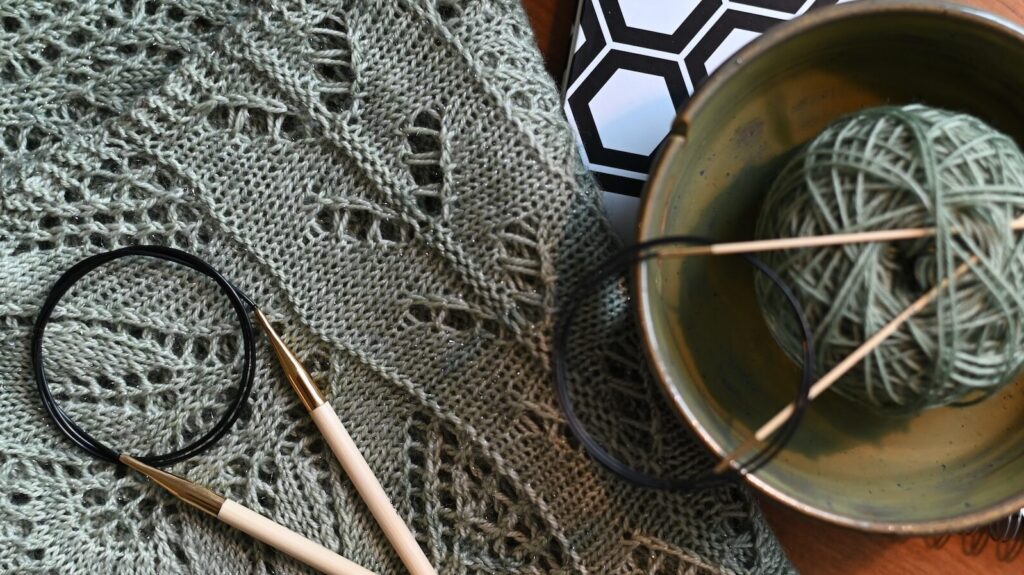Sara Baalla
I remember the first time I saw someone knitting, during one of the darkest periods of my mental health. Fate, it’s a funny thing. The hobby that saved my life just so happened to find me exactly when I needed it—when my life really needed saving.
If I were to say the word illness to you, what would you think of? Days in bed with a hot water bottle, a cup of tea, and a good Netflix series? Your loved ones waiting on you, hand and foot? When I was younger and home from school, I remember being treated to ice cream and bottles of Lucozade. My Irish grandma believed that fizzy drinks could cure all ailments.
It’s easy for someone to empathise when you describe your headache, stomachache, or toothache. But mental illness is a little different.
The darkest time of my life
It was 2016. I had recently turned 16, though it wasn’t that “sweet”. Not exactly the freedom I was anticipating when I finally came of age. I was 200 miles away from home in a psychiatric unit, recovering from an attempt on my life.
It’s a time that will forever define me, and one that I was once too ashamed to talk about. Now, I can acknowledge how those challenges shaped me into the resilient person I have grown to be. I am immensely proud of myself for undergoing those experiences, and having earned the recovery badges.
Knitting and my mental health
As you can imagine, there are a lot of limitations on a psychiatric ward. You can’t pop out for a walk to the corner shop or ring your friends for a catch-up, whenever you feel like it.
At the time, I didn’t have an outlet to express my emotions. I didn’t know why I was there. I couldn’t fathom the energy to work towards being discharged and returning home.
During the day, patients were allocated time between therapy and other activities to wind down and relax. I spotted someone knitting one afternoon and, much like a fairytale, I could start to see my happy ending.
“I can’t function without spending some time mindlessly knitting in front of the telly.”
As soon as I was discharged, I bought myself some knitting supplies and sat in front of a ‘knitting for beginners’ YouTube video. Cliché, I know, but the rest really was history.
Hundreds of knitted socks, jumpers, hats, and scarves later, knitting has become an essential part of my day-to-day well-being. I can’t function without spending some time mindlessly knitting in front of the telly. For me, nothing beats hand-making a gift for a loved one and seeing their smile when they receive it.
Knitting away the pandemic
A phrase familiar amongst mental health patients is “coping mechanisms”. These are two words that would often rub me up the wrong way in therapy sessions, but now hold so much power in my recovery.
What is a coping mechanism? I hear you ask. Coping mechanisms are defined as the “strategies people use in the face of stress and trauma to help manage painful or difficult emotions”. They help us to adjust to challenging situations while maintaining our emotional well-being.
During the pandemic, coping mechanisms became crucial for many people who didn’t have use for a hobby before.
“it can feel overwhelming to add something else to a packed schedule”
Everyone’s lives were put on hold in 2020. Plans were postponed and exciting trips abroad were cancelled. Being stuck at home indefinitely made picking up a new hobby a source of novelty. As a result, there was a huge rise in people trying something new to pass the time.
Knitting, cross stitching, and other creative hobbies blew up online, continuing even after the pandemic was over. Many celebrities have taken to social media to share their newfound crafts. The most notable was Tom Daley: his knitted cardigan went viral during the Olympic Games in Tokyo. The hobby Daley started as a meditative outlet has garnered thousands of adoring fans for his new Made With Love brand.
In normal life, it can be hard to find time for a hobby, especially with an already busy work schedule. Life really does move fast, so it can feel overwhelming to add something else to a packed schedule. But hobbies aren’t just another task to be completed. They can relieve work and life stresses.
The mental health benefits of knitting
After reading this, picking up a new hobby might sound appealing. As previously mentioned, having a hobby can marginally improve your mental and physical health. They reduce stress levels, which helps with sleep and other bodily functions.
“The more time I spend expressing myself creatively, the more time I crave to do just that.”
Sharing a hobby is also an amazing way to meet new people, offering you the opportunity to interact with people who share the same passion as you.
Hobbies can also be a healthy alternative to spending your time on social media or doom-watching the news. The more time I spend expressing myself creatively, the more addictive my hobby becomes.
Hobbies can be so important, particularly for our mental health. They challenge the little demons that sometimes plague our thoughts and help alleviate our anxieties. Knitting helped me through the darkest period of my mental health and it could help you too.
READ NEXT:
-
‘CYBERCHRONDRIA’: TIKTOK AND MENTAL HEALTH SELF-DIAGNOSIS
-
WHY ARE WOMEN MORE LIKELY TO SUFFER FROM DEPRESSION?
-
OVERTHINKING: THE NEVER-ENDING THOUGHTS
Featured image courtesy of Knit Pro on Unsplash. No charges have been made to this image. Image licence can be found here.
